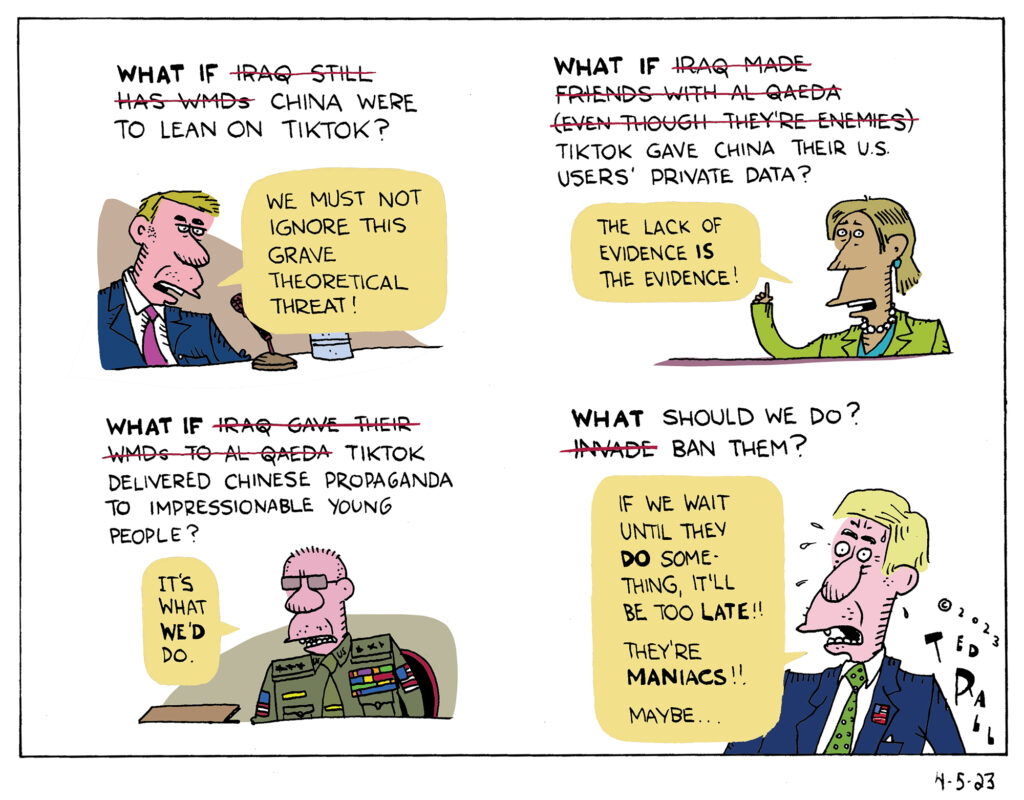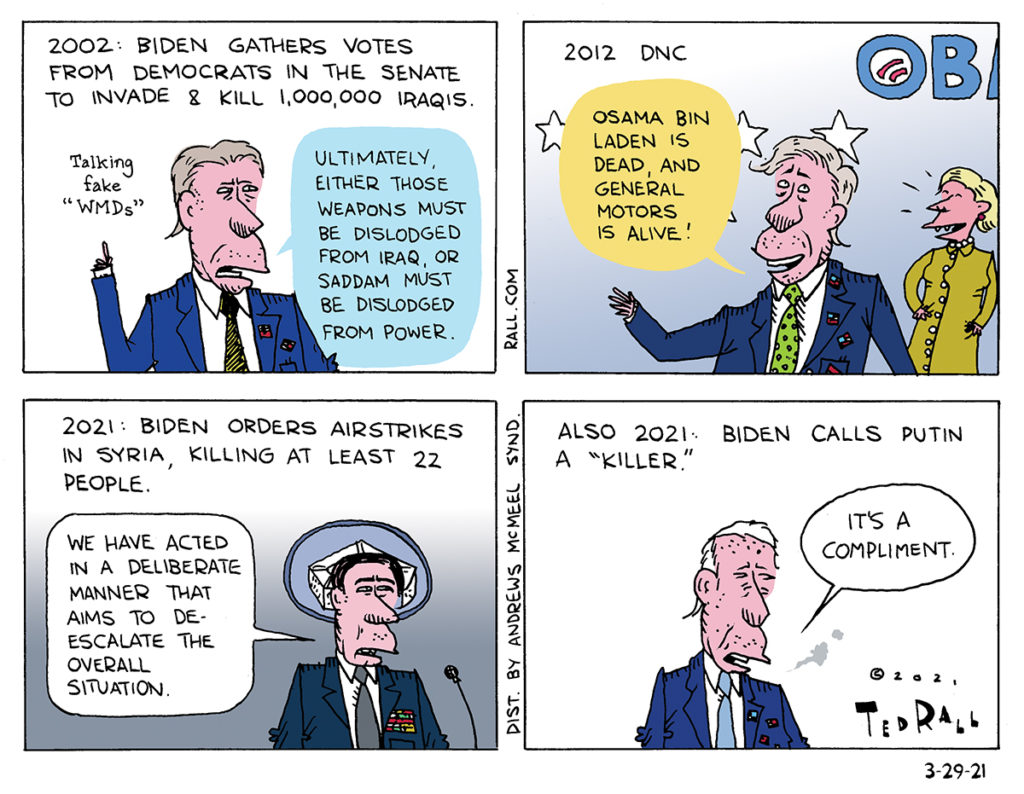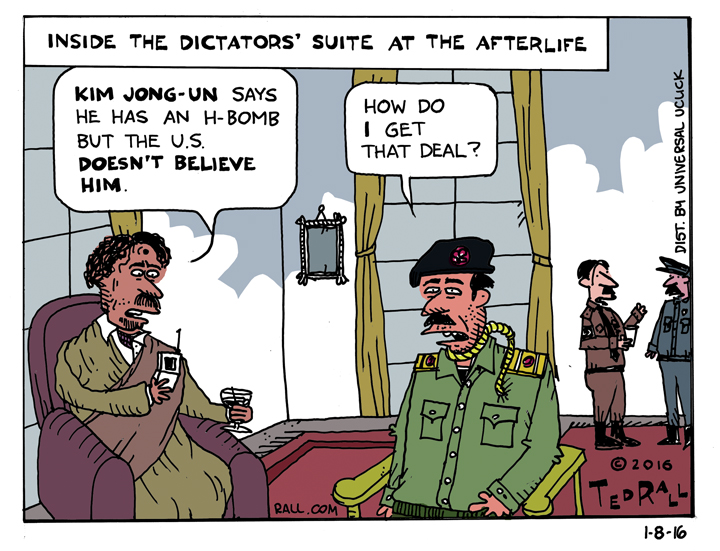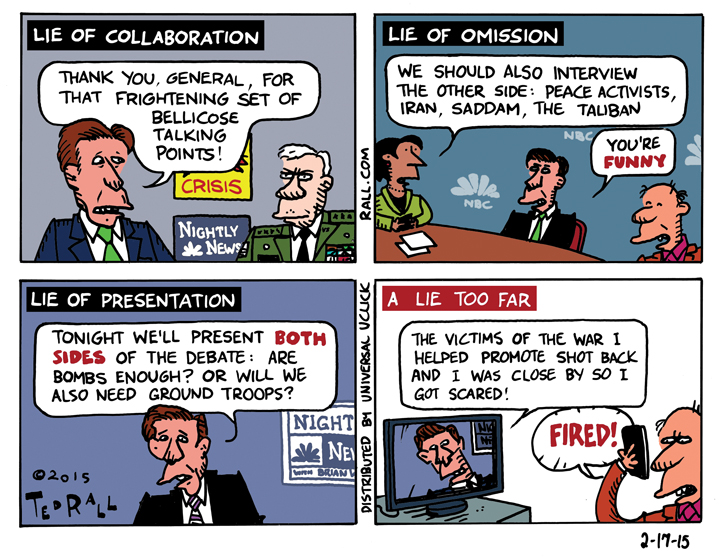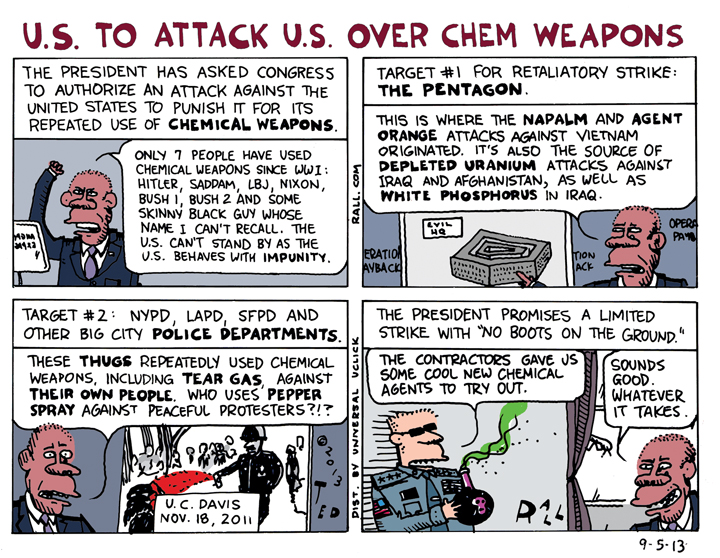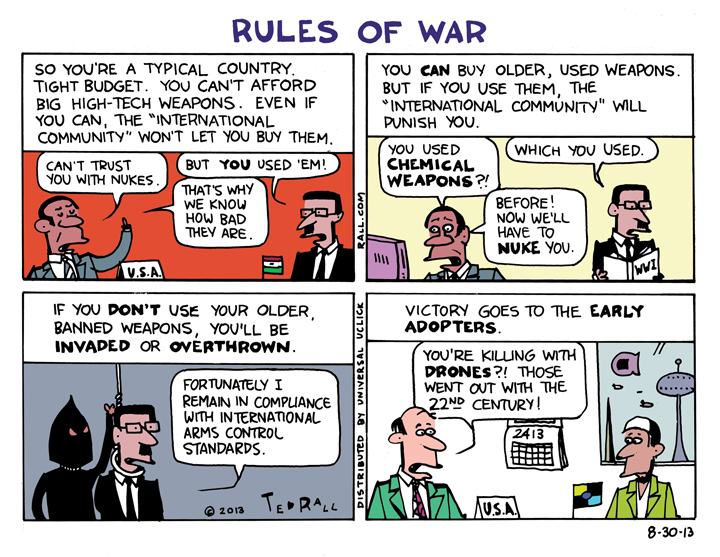Political attacks against the social media company TikTok are based on a lot of what-ifs with a heavy dose of racial bigotry. No evidence has been presented about the supposed “threats” other than theoretical speculation. Yet we are supposed to react to these paranoid delusions? This is the same thinking that got us into Iraq.
Will the Media’s Newfound Stridency Continue under Biden? No.
 “In his first rally since losing the election last month, President Trump continued to spout conspiracy theories about voter fraud, falsely claiming that he had defeated President-elect Joe Biden.” That was the lede of a news story in the December 5thWashington Post.
“In his first rally since losing the election last month, President Trump continued to spout conspiracy theories about voter fraud, falsely claiming that he had defeated President-elect Joe Biden.” That was the lede of a news story in the December 5thWashington Post.
The Associated Press took a similar tack. “President Donald Trump flooded his first postelection political rally with debunked conspiracy theories and audacious falsehoods Saturday as he claimed victory in an election he decisively lost,” began the wire service’s coverage.
You’ll find similarly opinionated news coverage about Donald Trump in almost every issue of many major newspapers over the last several years. It’s easy to see why many of the president’s supporters don’t trust the mainstream news media to be fair to conservatives.
You may long for a return to the days when too many reporters played the role of government stenographers, striving for a neutral tone while dutifully regurgitating the most ridiculous nonsense spewing out of the maws of official propagandists. Not me. Busy news consumers rely on journalists to frame and explain current events, not just reorganize press releases. Skepticism of presidents and labeling of their obvious lies is long overdue.
From Obama’s “if you like your healthcare plan, you can keep it” to Dick Cheney’s “there is no doubt that Saddam Hussein now has weapons of mass destruction,” the public would have benefited from news accounts that emphasized that these claims not only were not true but could not be true. As reporters knew, Obamacare was structured in a way that made it impossible for many pre-existing health insurance plans to remain financially viable within the system. There is always doubt in the military intelligence business. The credulous tone of this reporting enabled the mass misleading of the American people. Hundreds of thousands of Iraqis died as a result.
So when it comes to Trump, better late than never. But will journalists’ newfound courage survive into the Biden years? Early indications are discouraging.
Throughout the general election campaign journalists were unduly solicitous as the Democratic nominee generally shunned one-on-one interviews with major news organizations. In July, Biden only granted ten TV interviews, nine of which were with local outlets. Despite being the oldest major party candidate ever to run for president and repeated stumbles and verbal slips on the campaign trail, he faced few questions about his physical health or mental acuity. Liberal-leaning journalists largely dismissed Hunter Biden’s fiscal adventures in Ukraine as the product of the fevered imagination of far-right conspiracy theorists; Twitter and Facebook even censored a New York Post story about it. Now that a federal investigation into his taxes has been announced, Hunter is clearly a legitimate line of inquiry. Yet the issue is still not getting much coverage.
Accounts of Biden’s cabinet choices appear to harken a return to the stenographer days. Many praise the president-elect’s effort to increase “diversity” in a cabinet Democrats say will “look like America” while ignoring one type of diversity: ideological. Though Biden’s top advisers will include many women and some people of color, there is no indication that a single progressive will be in the room while he decides the fate of the nation.
Stories about Pete Buttigieg’s nomination as secretary of transportation bury the elephant in the room. “President-elect Joe Biden will nominate former Democratic presidential candidate Pete Buttigieg to be Transportation secretary…” Politico began its story. “Buttigieg’s ascension to the top spot at DOT marks the culmination of a meteoric rise in politics over the last two years from the mayor of South Bend, Ind., to the first openly gay Cabinet secretary, if he is confirmed.” A reference to Buttigieg’s “thin transportation policy resume” appears in paragraph five.
Had the story been about Trump’s cabinet pick, it likely would have begun something like: “Overlooking experienced transit experts, President-elect Joe Biden instead turned to a young loyalist who helped hand him the nomination, former South Bend, Ind. mayor Pete Buttigieg, to head the transportation department. South Bend, a city of 100,000, has a fleet of 60 buses.” Tone matters.
All presidents lie. Biden lies too, as when he denied voting for the Hyde amendment during a primary debate. One hopes that the media will treat him harshly when he does it again, both to be consistent with the more strident scrutiny they have directed at Trump the last four years and to better serve their readers and viewers. But it doesn’t look likely.
(Ted Rall (Twitter: @tedrall), the political cartoonist, columnist and graphic novelist, is the author of “Political Suicide: The Fight for the Soul of the Democratic Party.” You can support Ted’s hard-hitting political cartoons and columns and see his work first by sponsoring his work on Patreon.)
Inside the Dictator’s Suite
Apparently afflicted with a bizarre determination to disbelieve everyone else, the United States refused to believe Saddam Hussein when he said he didn’t have weapons of mass destruction. Which he didn’t. Now Kim Jong-un says he does have a hydrogen bomb, and the United States refuses to beleve him.
SYNDICATED COLUMN: No One Should Be Sad When George H.W. Bush Dies (Probably Soon)
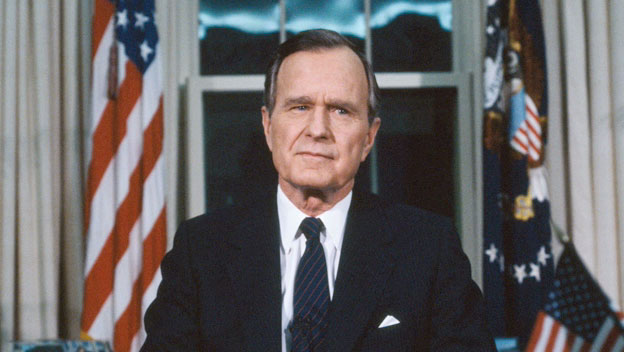 The curtain is about to fall on George Herbert Walker Bush, known colloquially as Bush 41, or simply 41. The patriarch is, if not exactly dying, no longer doing well enough to want to be seen much in public. The final taxi, as Wreckless Eric sang memorably though not famously, awaits.
The curtain is about to fall on George Herbert Walker Bush, known colloquially as Bush 41, or simply 41. The patriarch is, if not exactly dying, no longer doing well enough to want to be seen much in public. The final taxi, as Wreckless Eric sang memorably though not famously, awaits.
Do not believe the soon-to-be-everywhere hype.
Dubya’s dad is and was a very bad man.
No one should forget that.
The old Skull and Bones man has skillfully set the stage for — not his rehabilitation exactly, for he was never shamed (though he much deserved it) — his rescue from the presidential footnotery familiar to schoolchildren, that of the Adamsian “oh yeah, there was also that Quincy” variety. The centerpiece of this so-far-going-splendidly historical legacy offensive is his authorized biography by Jon Meacham, “Destiny and Power: The American Odyssey of George Herbert Walker Bush,” a demi-hagiographic positioning of HW as a moderate last half of the 20th century Zelig.
This has been done before, compellingly and brilliantly, in Robert Caro’s soon-to-be five-volume (!) biography of LBJ. Caro uses LBJ as a window into his times; that’s what Meacham is up to too. But there’s a big whopping difference between the subjects. LBJ was a man of principle who was also a cynical SOB; Vietnam tarnished his amazing civil-rights legacy. He knew that and regretted it until he died. Dude was complicated.
There is, sadly, little evidence that Bush ever had a big ol’ destiny in mind, good or bad. He may be the first of that crop of presidents who followed them (excepting, perhaps, ironically, his son after 9/11) whose main goal in life was accomplished when he won a presidential election. Clinton and Obama and perhaps Hillary next, they all figured they’d figure out how and why to change America after they took office and some stuff to react to happened (OK, that includes W).
“Mr. Bush may never have achieved greatness. But he’s led a long and remarkable life, which has spanned the better part of the 20th century. He fought in World War II. He started a successful oil business. He spent two terms in the House of Representatives; he served as ambassador to the United Nations and as American liaison to China; he ran the Republican National Committee and, far more important, the C.I.A. He was vice president for eight years and president for four. At 90, he jumped out of an airplane,” Jennifer Senior writes in the New York Times Book Review.
Pardon my shrug. Dude’s a boy Hillary. Great résumé. What did you accomplish at all those gigs? Even at the CIA, he’s remembered for…
Yeah.
Where there’s a record starts with his 1988 run for president. Neither the advantages of incumbency as Reagan’s vice president nor his Democratic rival Michael Dukakis’ awkwardness on the campaign trail were enough for him; he felt it necessary to deploy scorched-earth tactics to obliterate a good man, albeit a politician not prepared for the national stage against a GOP that had turned rabidly right under Reagan. Lee Atwater’s “Willie Horton” ad remains a colossus of scurrilous race-baiting, a dismal precedent that paved the way for Bush 43’s racist whispering campaign targeting John McCain’s adopted daughter in the South Carolina primary and Donald Trump’s glib desire to subject the nation’s Muslims to an Americanized Nuremberg Law.
We won’t hear about Willie Horton during “ain’t it sad HW died” week.
“His campaign tactics may have been ruthless, but in person he was unfailingly decent and courteous, commanding remarkable levels of loyalty. Character was his calling card, not ideas. To the extent that he had one at all, his governing philosophy was solid stewardship: leading calmly and prudently, making sure the ship was in good form, with the chairs properly arranged on the decks,” Senior writes.
Of course he was polite. He’s a WASP. But does it matter? A public figure isn’t notable for what he does behind closed doors.
And Hitler liked dogs and kids.
Bush deserves, as do we all, to be judged for what he set out to do.
It is by his own standards — his wish to leave the ship of state ship-shape when he left for Kennebunkport in 1993 — that he falls terribly short.
It was the economy, stupid…and he was the stupid one. After the stock market crashed in 1989, HW sat on his hands, waiting for the recession to magically go away. As the invisible hand of the marketplace dithered and dawdled, the housing market crashed too. Millions lost their jobs. Countless businesses went under. Lots of misery, much of it avoidable. Much of which could have been mitigated with a little action from the Fed and a Keynesian stimulus package. He did little.
By the time he left, everyone, not least Wall Street traders, breathed a sigh of relief that there was going to be someone at the wheel going forward.
There were, of course, the wars. There’s his good war against Iraq, for which he gets credit for merely slaughtering Saddam’s army as they retreated down the “highway of death” and not going on to kill everyone in Baghdad, as his stupid bloodthirsty son tried to do. Mainly, the Gulf War is a plus because few Americans died in combat (some “war” dead were killed in forklift accidents). Still, it was a war that needn’t have been fought in the first place.
In a now largely forgotten episode, the Iraqi dictator Saddam Hussein — then a U.S. buddy — asked permission to invade Kuwait, which was “slant drilling” into Iraqi oilfields and undercutting OPEC cartel prices. It being August, all the big names were away on vacation, so Saddam took the word of a low-level drone at the State Department that everything was cool.
It wasn’t.
If Bush had been a decent manager — the kind of guy who arranges the deck chairs — he would have had better people handling his pet tyrants.
Then there’s the truly sorry invasion of Panama. No one remembers now, but this was Bush’s first personnel dispute with a dictator. General Manuel Noriega was getting uppity, HW decided to put him in his place, the Marines slaughtered thousands of Panamanians. Really, for no reason.
Certainly without justification. Noriega was sent to a US prison, having spent more than two decades on trumped-up cocaine charges. Which you might care about. Noriega wasn’t a nice guy, right?
The trouble is, treating a sovereign head of state like a common criminal scumbag sets some bad precedents.
Now, when the US approaches guys like Syria’s Bashar Al-Assad to suggest that he leave office, he digs in his heels for fear of winding up in prison or worse. Back in the pre-Panama days, you could convince a guy like the Philippines’ Ferdinand Marcos to fly to Hawaii with a duffel bag full of bullion, so everyone could move on.
There’s the goose-gander thing. Why shouldn’t Assad be able to argue that Obama ought to be imprisoned for breaking Syrian law, like those against funding terrorist groups like ISIS?
Bush’s biggest boner may have been his hands-off approach to the collapse of the Soviet Union. Rather than help Russia and the other former Soviet republics come in for a soft post-socialist landing, as in China after Mao, Bush’s guys quietly rejoiced in the mayhem.
Clinton gave us “shock economics,” Yeltsin, mass starvation, the destruction of Grozny and the oligarchs — but Bush set the stage for a mess with which we, and more importantly the Russians, are dealing today.
Any way you look at it, George Bush Senior left the world worse off than it was.
The possibility that he may have been courteous to his minions and henchmen doesn’t change that.
(Ted Rall, syndicated writer and the cartoonist for ANewDomain.net, is the author of the new book “Snowden,” the biography of the NSA whistleblower. Want to support independent journalism? You can subscribe to Ted Rall at Beacon.)
COPYRIGHT 2015 TED RALL, DISTRIBUTED BY CREATORS.COM
A Lie Too Far
NBC News anchorman Brian Williams got in trouble for fibbing about a supposed close call while embedded with US soldiers occupying Iraq in 2003. Why didn’t he get in trouble for being embedded in the first place? Or for the bigger lies inherent in the way he and other news networks package US government and military propaganda?
SYNDICATED COLUMN: 7 Questions You Should Ask About Syria
Lightening-Quick Obama Makes Bush’s “Rush to War” Look Slow and Methodical
Ten years ago, George W. Bush and his henchmen were beginning their war against Iraq. They wanted to invade hours after 9/11. But conning Congress and the public into invading a country that posed no threat to us delayed the invasion until March 2003. This week, as the media celebrates the 50th anniversary of the March on Washington and Martin Luther King’s iconic speech, it is shock- and awe-inspiring to see how far America has come. Where it took a white president a year and a half to pour on enough lies of omission, contextual lapses and leaps of logic to gin up a stupid, illegal war in the Middle East, our black president did it in a week.
Here we go again. A Baathist autocrat is in American crosshairs. The justification: WMDs. Also, he “kills his own people.” Which we haven’t cared about before. But: WMDs.
Ten years ago, the Baathist tyrant of Iraq denied the WMD accusations and invited UN weapons inspectors to verify his claim. Which they did. Because he was telling the truth. But the Bushies didn’t want to wait. No time! Had to invade right away!
And: again. “At this juncture, the belated decision by the regime to grant access to the UN team is too late to be credible,” an Obama official said five days after Syrian troops allegedly fired poison gas into a neighborhood on the outskirts of Damascus, killing over 1000 people.
“Too late”? Really? Assad’s government OKed the inspection less than 48 hours after the UN asked. On a weekend. I have editors who don’t get back to me that quickly. Doesn’t seem like a slow response from a government that doesn’t have diplomatic relations with the U.S. Also, they’re kinda busy fighting a civil war.
Now is a good time to think about some things the American mainstream media is omitting from their coverage — concerns strikingly similar to issues that never got discussed back in 2002 and 2003.
1. “Chemical weapons were used in Syria,” Secretary of State John Kerry says. Probably. But by whom? Maybe the Syrian army, maybe the rebels. Experts tell NPR: “The Free Syrian Army has the experience and perhaps even the launching systems to perpetrate such an attack.” Maybe we should ease off on the cruise missiles before we know which side is guilty.
2. Assuming the attack was launched by the Syrian army, who gave the order to fire? Maybe it’s Assad or his top generals. Assad denies this, calling the West’s accusations “nonsense” and “an insult to common sense.” Which, when you think about it, is true. As Barbara Walters and others who have met the Syrian dictator have found, Assad is not an idiot or a madman. He is a well-educated, intelligent man Why would he brush off Obama’s “red line” about the use of chemical weapons last year? His nation borders Iraq, so it’s not like he needs reminders of what happens when you attract unwanted attention from the U.S. Why would Assad take that chance? His forces are doing well. If the attack came from Assad’s forces, maybe it originated on the initiative of a lower-level officer. Should the U.S. go to war over the possible actions of a mid-ranked army officer who went rogue?
3. “The options that we are considering are not about regime change,” says the White House PR flack. So why is Obama “days away” from a military strike? To “send a message,” in Beltway parlance. But the air war that the attack on Syria is reportedly being modeled after, Clinton’s campaign against Serbia during the 1990s, caused the collapse of the Serbian government. Regional players think, and some hope, that degrading Assad’s military infrastructure could turn the war in favor of the Syrian rebels. If toppling Assad isn’t Obama’s goal, why chance it?
4. When you bomb one side in a civil war — a side that, by the way, might be innocent of the chemical attack — you help their enemies. Assad is bad, but as we saw in post-Saddam Iraq, what follows a dictator can be worse. Syria’s rebel forces include radical Islamists who aren’t very nice guys. They’ve installed Taliban-style Sharia law in the areas they control, issuing bizarre edicts (they’ve outlawed croissants) and carrying out floggings and executions, including the recent whipping and fatal shooting of a 14-year-old boy for making an offhand remark about Mohammed. Obama is already sending them arms and cash. Should we fight their war for them too?
5. Why are chemical weapons considered especially bad? Because the U.S. has moved on to other, more advanced ways to kill people. And because we claim to be exceptional. Paul Waldman of The American Prospect notes: “We want to define our means of warfare as ordinary and any other means as outside the bounds of humane behavior, less for practical advantage than to convince ourselves that our actions are moral and justified.” And, as Dominic Tierney argued in The Atlantic, “Powerful countries like the United States cultivate a taboo against using WMD partly because they have a vast advantage in conventional arms.” If 100,000 people have died in Syria during the last two years, why are these 1000 deaths different?
6. White phosphorus is a chemical weapon that kills people with slow, agonizing efficiency, melting their bodies down to their bones. The U.S. dropped white phosphorus in Iraq, notably in the battle of Fallujah. The U.S. uses depleted uranium bombs in Afghanistan. Those are basically chemical weapons. The U.S. uses non-chemical weapons that shock the world’s conscience, such as cluster bombs that leave brightly colored canisters designed to attract playful children. Assuming the Assad regime is guilty as charged of the horrors in Damascus, why does the U.S. have the moral standing to act as jury and executioner?
7. Why us? Assuming that military action is appropriate in Syria, why is the United States constantly arguing that we should carry it out? Why not France, which has a colonial history there? Or Turkey, which is right next door? Or, for that matter, Papua New Guinea? Why is it always us?
Because our political culture has succumbed to militarism. Which has made us so nuts that we’ve gone from zero to war in a week. Which brings up a quote from the “forgotten MLK,” from 1967: “I knew that I could never again raise my voice against the violence of the oppressed in the ghettos without having first spoken clearly to the greatest purveyor of violence in the world today — my own government.”
Some things never change.
(Ted Rall’s website is tedrall.com. Go there to join the Ted Rall Subscription Service and receive all of Ted’s cartoons and columns by email.)
COPYRIGHT 2013 TED RALL
SYNDICATED COLUMN: Get Pissed Off and Break Things
Why Are Americans So Passive?
There’s a reason “Keep Calm and Carry On” is everywhere. When people lose everything — their economic aspirations, their freedom, their privacy — when there’s nothing they can do to restore what they’ve lost — all they have left is dignity.
Remember Saddam? Seconds before he was hanged, disheveled and disrespected, the deposed dictator held his head high, his eyes blazing with contempt as he spat sarcastic insults at his executioners. He “faced death like a lion,” said his supposed body double, Latif Yahia, and no one could argue. He left this life with the one thing he could control intact.
Dignity. That’s what “Keep Calm and Carry On” is all about. That’s what we think of when we think of the Battle of Britain. As German bombs rained down, the English went about their business. Like the iconic photo of the milkman tiptoeing over rubble. Like the bomb-damaged stores whose shopkeepers posted signs that read “We are still open — more open than usual.”
Man, that is so not us.
You’ve seen the T-shirts, with their clean Gill Sans-esque lettering and iconic crown. There are mugs, postcards and posters. Of course. It’s a reproduction of a propaganda poster from World War II, an (unsuccessful, because it wasn’t distributed) attempt by the British government to steel jittery citizens during the Blitz.
“Keep Calm and Carry On” merch dates to 2000 but really took off after 9/11; the popularity of the image, the stoicism of its call to stiffen upper lips everywhere, and numerous parodies (“Stay Alive and Kill Zombies”) has generated millions of dollars of profits, inevitably sparking lawsuits and inspiring a song by John Nolan.
Why is a meme originally prepared for a possible German invasion of the UK (which is why it wasn’t released) popular now? Zizi Papacharissi, communications professor at the University of Illinois at Chicago, points to the crappy economy. “We are undergoing a profound and fairly global economic crisis, so it is natural to revisit the saying: Keep calm and carry on. It reminds us of courage shown back then, and how courage shown helped people pluck through a crisis.”
It’s also a reaction to terrorism — or more accurately a reaction to the initial reaction to the 9/11 terrorist attacks: hysteria, jingoism, multiple wars of choice, all doomed. More than any other factor, Obama owed his 2008 victory to his (Maureen Dowd called him) Vulcan personality: cool, implacable, possibly non-sentient, the anti-Dubya.
What wouldn’t we give for a 2001 do-over? No invasions, no Patriot Act, no Gitmo, no “extraordinary renditions,” no New York Times op-ed pieces arguing in favor of “enhanced interrogation techniques.” Treat 9/11 like a crime, let the FBI go after the perps. Reach out to Muslims, reconsider our carte blanche to Israel, and most of all: go slow. Don’t freak out.
Perspective: 3,000 deaths is awful. 9/11 was shocking. We killed 2 million Vietnamese people, yet they’re going strong. With a minimum of whining.
And yet…
Sometimes you need some perspective to your perspective.
There are times when it’s appropriate to freak out. When, in fact, it’s downright weird and unhealthy and wrong not to flip your lid. For example, when you get diagnosed with a terrible disease. When someone you love dies.
There are also times when big-picture, impersonal stuff, including politics and the economy, ought to make you crazy with rage or grief or…something. Not nothing. Not just keeping calm and carrying on.
Keeping calm and carrying on was an appropriate response to the Blitz. Short of moving away from the targeted area, there’s nothing you can do about bombs. Living or dying is a matter of happenstance. Keeping calm might help you make smart decisions. Panic is usually more dangerous than self-control.
The same is true of terrorism. Terrorists will kill you, or not — probably not. You can’t fix your fate.
But that is decidedly not true about the economy. Not when what is wrong with the economy is not something no one can control — a giant meteor, bad weather, panic in the markets — but something that most assuredly can and indeed should be, like the systemic transfer of wealth from the poor and middle-class to the rich that has characterized the class divide in Western nations since the 1970s. The appropriate, intelligent and self-preserving response to mass theft is rage, demands for action, and decisive punishment of political and economic leaders who refuse to change things.
As one revelation about the National Security Agency’s spying follows another, the “Keep Calm and Carry On” meme seems less like an appeal to dignity and calm reserve than the much older, classic response of the power elite to their oppressed subjects: Shut the Fuck Up.
(Ted Rall’s website is tedrall.com. His book “After We Kill You, We Will Welcome You Back As Honored Guests: Unembedded in Afghanistan” will be released in March 2014 by Farrar, Straus & Giroux.)
COPYRIGHT 2013 TED RALL

